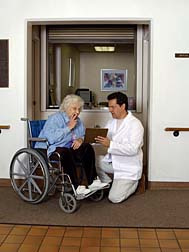Nursing Home Abuse Citations on the Rise
 By Gordon Gibb
By Gordon Gibb
Just prior to Christmas, it was revealed that serious reprimands for dangerous conditions at nursing homes had increased 22 per cent over a six-year period ending in 2006. These citations can run the gamut from not providing patients their necessary meds, to cases of physical and sexual abuse of residents.
The data, obtained through records from the US Centers of Medicare and Medicaid Services (CMMS, the authority which regulates nursing homes in the United States) for a study sponsored by the publication USA Today, does not specify if such cases of abuse are between residents, or between residents and staff.
What's more, according to data attributed to the CMMS, residents of nursing homes held by private equity suffer more from depression, loss of mobility and the loss of ability to bathe, and dress themselves. Federal and state regulators have said that citations for things such as restraining residents for long periods, and the serving of moldy food have increased at every nursing home owned, and controlled by a private equity firm.
It appears that the days of the small, family-run nursing home where residents are treated like family are few and far between, and their days may be numbered.
Meanwhile, nursing home abuse is on the rise. Many workers complain of long hours and short staffing—a definite disadvantage when dealing with some problematic residents. And while nursing homes have been cited for everything ranging from serving cold food, to not managing catheters properly to the detriment of the patient, there are other issues at play.
Some residents can be aggressive, especially those suffering from dementia. And this appears to be an increasing problem. In Canada, for example, expensive psychiatric beds are being shut down. Elderly psychiatric patients often wind up in nursing home beds, which are far less expensive.
















No comments:
Post a Comment